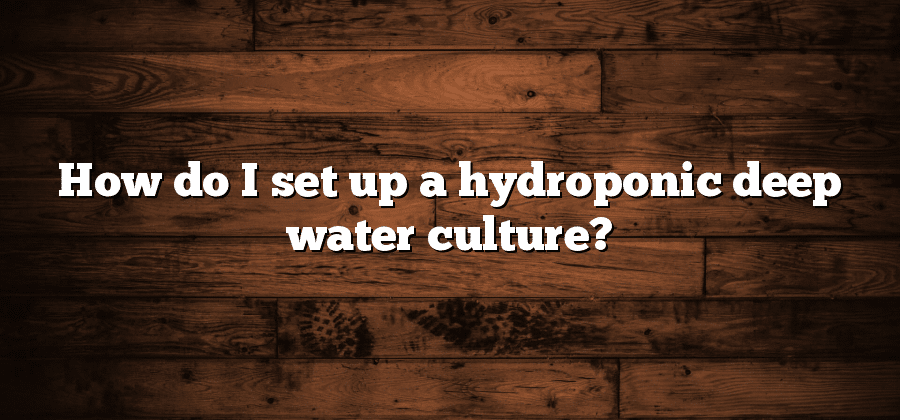Understanding Hydroponic Deep Water Culture Systems
Deep water culture (DWC) is a popular hydroponic system that allows plants to grow directly in water, without the use of soil. In this system, the plant roots are suspended in a nutrient-rich solution, providing them with all the necessary elements for growth. The key feature of DWC is the use of oxygenation to ensure that the roots receive ample oxygen, which is essential for their development. This is achieved by using an air pump or air stone to continuously introduce bubbles in the nutrient solution. These bubbles not only provide oxygen to the roots but also help in preventing the growth of harmful bacteria and fungi.
One of the advantages of deep water culture is its simplicity and low cost compared to other hydroponic systems. It is relatively easy to set up and requires minimal maintenance. Additionally, by eliminating soil from the equation, DWC allows for better control over nutrient absorption by the plants. This leads to faster growth rates and higher yields. However, it is important to monitor the nutrient solution regularly to ensure that the levels of essential elements are maintained within the optimal range. Providing proper lighting and temperature is also crucial for the successful growth of plants in a DWC system.
Selecting the Right Equipment for Deep Water Culture
When it comes to setting up a hydroponic deep water culture (DWC) system, selecting the right equipment is crucial for the success of your growing endeavor. One of the primary components you’ll need is a reservoir tank, which will serve as the container for your nutrient solution. The size of your reservoir will depend on the number of plants you plan to grow and the space you have available. It’s important to choose a tank made from a durable material, such as thick plastic or fiberglass, to ensure longevity and prevent any potential leaks.
Next, you’ll need to invest in an air pump and air stones. These components are essential for oxygenating the nutrient solution, which is vital for the health and growth of your plants’ roots. The air pump should have the capacity to adequately oxygenate the entire volume of your reservoir, and the air stones should be placed strategically to ensure maximum oxygen distribution. Opt for high-quality air pumps and stones to ensure reliable and efficient performance throughout the lifespan of your DWC system.
Preparing the Reservoir for Deep Water Culture
When setting up a deep water culture (DWC) hydroponic system, proper preparation of the reservoir is crucial for optimal plant growth. The reservoir serves as the container for the nutrient solution, which is the primary source of nourishment for the plants. Before filling the reservoir with water, it is important to clean it thoroughly to remove any debris or contaminants that could potentially harm the plants. Scrubbing the walls and bottom of the reservoir with a mild bleach solution can help to sanitize the container and prevent the growth of harmful microorganisms. Rinse the reservoir thoroughly with clean water to ensure that no traces of bleach remain.
After cleaning the reservoir, it is important to properly size it based on the number of plants you plan to grow. The reservoir should be spacious enough to accommodate the root systems of the plants and allow for easy access during maintenance. Additionally, the reservoir should be made of a food-grade material that is durable and resistant to corrosion. Popular options include plastic containers or buckets made from PVC or polyethylene. It is important to avoid using materials that can leach harmful chemicals into the nutrient solution, as this can negatively impact plant health.
Choosing the Ideal Nutrient Solution for Hydroponic DWC
When it comes to choosing the ideal nutrient solution for your hydroponic deep water culture (DWC) system, there are several factors to consider. First and foremost, it is important to understand the specific nutrient requirements of the plants you will be growing. Different plants have different nutritional needs, and providing the right balance of nutrients is essential for their growth and development.
One key consideration is the ratio of macronutrients to micronutrients in the nutrient solution. Macronutrients include elements such as nitrogen (N), phosphorus (P), and potassium (K), which are required by plants in relatively large quantities. Micronutrients, on the other hand, are essential elements that plants need in trace amounts, such as iron (Fe), manganese (Mn), and zinc (Zn). It is crucial to find a nutrient solution that provides an appropriate balance of these nutrients, as well as other essential elements like calcium (Ca) and magnesium (Mg), to support healthy plant growth.
In addition to nutrient balance, it is also important to consider the quality and purity of the nutrient solution. Using a high-quality solution that is free from contaminants and impurities will help ensure that your plants receive the best possible nutrition. Look for nutrient solutions that are made from high-quality ingredients and have been tested for purity. It may also be beneficial to choose a solution that is specifically formulated for DWC systems, as these are often optimized for the unique needs of plants grown in this method.
Overall, selecting the ideal nutrient solution for your hydroponic DWC system is a crucial step in ensuring the success of your crop. By considering the specific nutritional requirements of your plants and choosing a solution that provides the right balance of macronutrients and micronutrients, as well as ensuring its quality and purity, you can provide your plants with the best possible nutrition for healthy and productive growth.






